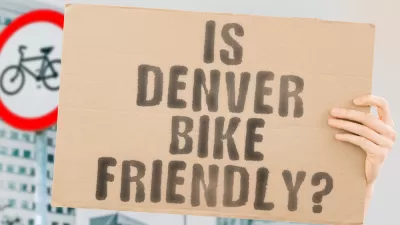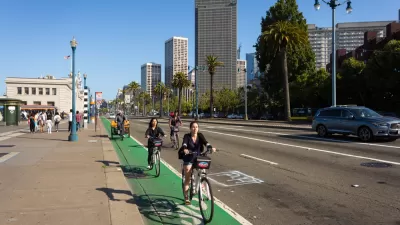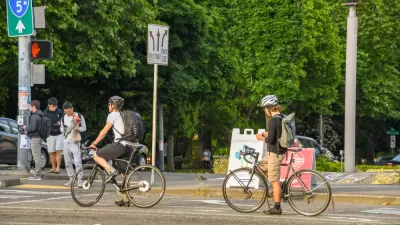Colorado is the latest state to make it legal for people on bikes to treat stop signs like yield signs when no cars are in the intersection.

Colorado Governor Jared Polis signed the “Colorado Safety Stop” into law on April 13, 2022, making it legal for people on bikes to treat stop signs as yield signs and treat stop lights as stop signs, according to an article by Bicycle Colorado.
The article cites data that shows the Safety Stop—known in bicycle and planning circles as the Idaho Stop—reduces collisions involving people on bikes and automobile. Delaware, which adopted a similar law in 2017, has seen a 23 percent drop in collisions involving bicycles at stop sign controlled intersections. Researchers from DePaul University published a study in 2016 that also supported Idaho Stops for the safety of people on bikes.
Bicycle Colorado also provides additional information on the new law, as listed in the source article:
- Younger bicyclists may perform the maneuver if an adult is present.
Bicyclists can yield and then proceed through stop sign-controlled intersections at up to 10 miles per hour. - Intersections where bicyclist-specific lights or signs are present that prohibit the maneuver are exempt from the new law.
- The bill defines “low speed conveyances” in Colorado law. These are small profile, low-speed vehicles that people use for transportation and recreation, including bicycles and electric bicycles, electric scooters (not including mopeds), and wheelchairs.
The Colorado Legislature approved the law in March 2022, paving the way for this week’s historic bill signing. Bicycle Colorado says the law has been in the works for years.
The state of Colorado now joins Idaho, Delaware, Arkansas, Oregon, Washington, North Dakota, Utah – 2021, and Oklahoma among states where the Idaho Stop is the law of the land. California could have been on the list, but Gov. Gavin Newsom vetoed AB 122 in 2021.
FULL STORY: The Colorado Safety Stop is the law of the land

Maui's Vacation Rental Debate Turns Ugly
Verbal attacks, misinformation campaigns and fistfights plague a high-stakes debate to convert thousands of vacation rentals into long-term housing.

Planetizen Federal Action Tracker
A weekly monitor of how Trump’s orders and actions are impacting planners and planning in America.

Chicago’s Ghost Rails
Just beneath the surface of the modern city lie the remnants of its expansive early 20th-century streetcar system.

Bend, Oregon Zoning Reforms Prioritize Small-Scale Housing
The city altered its zoning code to allow multi-family housing and eliminated parking mandates citywide.

Amtrak Cutting Jobs, Funding to High-Speed Rail
The agency plans to cut 10 percent of its workforce and has confirmed it will not fund new high-speed rail projects.

LA Denies Basic Services to Unhoused Residents
The city has repeatedly failed to respond to requests for trash pickup at encampment sites, and eliminated a program that provided mobile showers and toilets.
Urban Design for Planners 1: Software Tools
This six-course series explores essential urban design concepts using open source software and equips planners with the tools they need to participate fully in the urban design process.
Planning for Universal Design
Learn the tools for implementing Universal Design in planning regulations.
planning NEXT
Appalachian Highlands Housing Partners
Mpact (founded as Rail~Volution)
City of Camden Redevelopment Agency
City of Astoria
City of Portland
City of Laramie





























